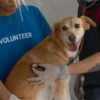Is your dog slowing down? Learn the 9 key signs of aging in senior dogs and how to provide loving, vet-approved care for their golden years.
Petggy Pet Care Insight: Dogs are humans‘ best companions, dedicating their lives to being by our side.
The average lifespan of a dog is usually between 10 to 20 years. Before we know it, our beloved furry friends may begin to show signs of aging. As they grow older, dogs gradually exhibit various signs of aging.
Table of Contents
Fur Lightening
Just as humans experience gray hair as they age, dogs do as well. They may develop gray whiskers, and the fur on their body may change. Typically, the first changes occur on their face and paws.
Decreased Mobility
Older dogs tend to experience a decrease in mobility. Joint issues become more common, and dogs begin to reduce their jumping activity.
Calluses
Old dogs may develop calluses on various parts of their body, especially on areas that frequently rub, like their elbows or the joints of their back legs.
Dental Issues
Common oral problems in senior dogs include bad breath, tartar buildup, and periodontal disease. In severe cases, these issues can lead to heart and kidney problems.
Incontinence
Older dogs may struggle with urinary or fecal incontinence due to various reasons. As pet owners, it’s important to be patient and understanding with them.
Constipation
Due to a weakened digestive system and reduced physical activity, elderly dogs often suffer from constipation.
Decline in Hearing and Vision
A decline in hearing and vision is a sign that a dog is entering its senior years.
For dogs who are completely deaf or visually impaired, special care and necessary accommodations should be considered to provide them with a more comfortable living environment.
Weakened Immune System
As the immune system weakens, senior dogs are more susceptible to allergies, colds, or viral infections.
Behavior Changes
Senior dogs may also experience dementia, causing confusion even in familiar surroundings. They may become less social due to joint pain or feel embarrassed by incontinence. The loss of hearing and sight can further result in changes in behavior.
Older dogs should have regular health check-ups to prolong their lives as much as possible and ensure they enjoy a peaceful and comfortable old age.









Add comment